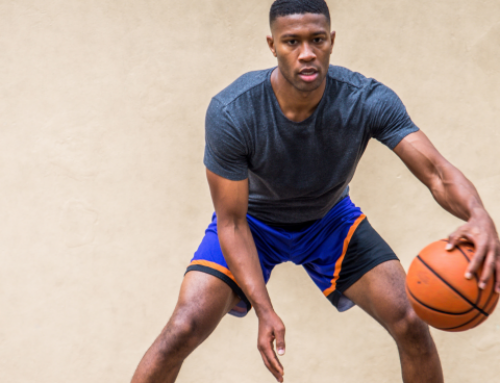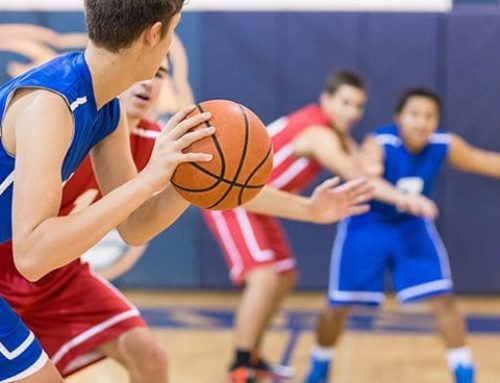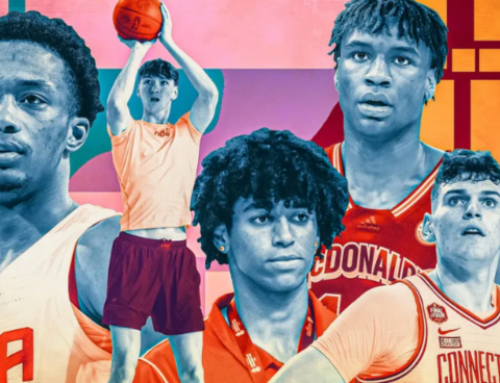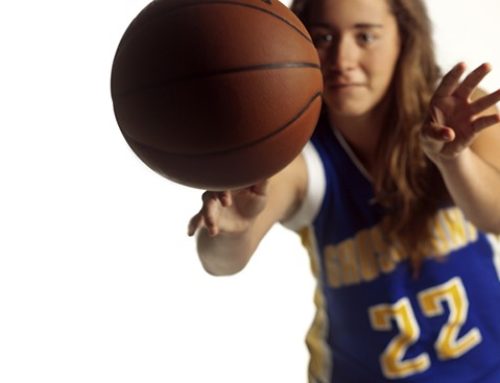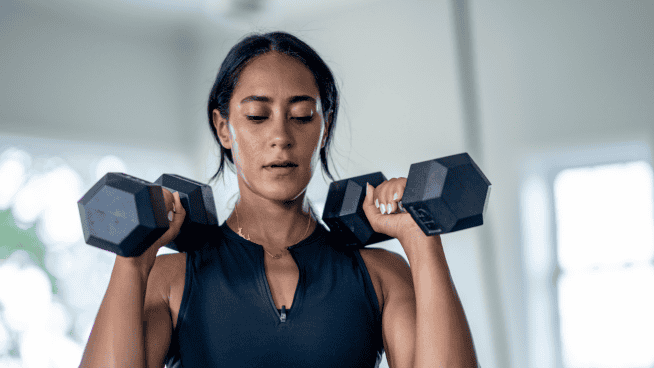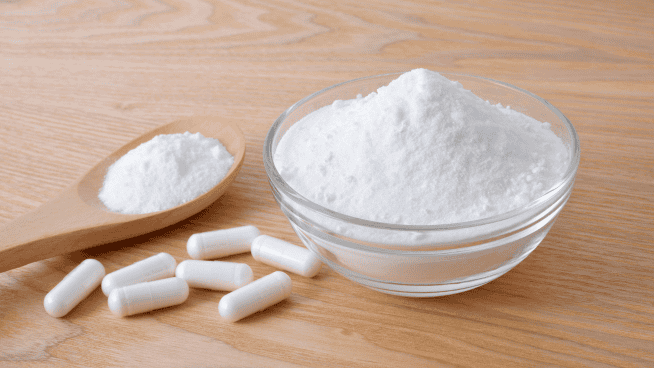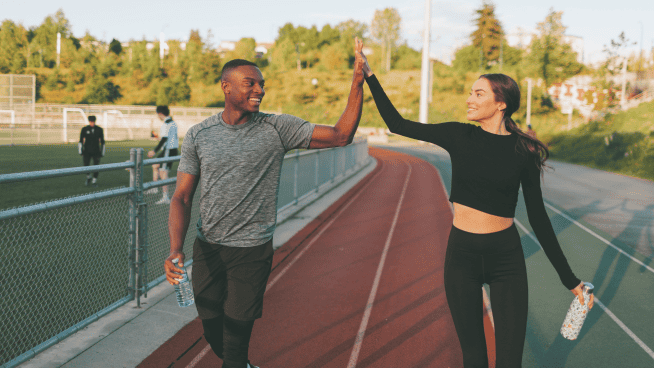Interview with Chauncey Billups
By: Chad Zimmerman
With an NBA Championship ring gracing his hand and a Finals MVP award garnishing his trophy case, Chauncey Billups should be satisfied with his game and accomplishments, right? Wrong. Watch the man train and speak to him about his attitude, and it’s clear that Billups always has unfinished business.
During a break from a summer training session with IMG Basketball Academy Director Joe Abunassar, the Detroit Pistons superstar told STACK how he works to maximize his performance.
STACK: How does the training you do now compare with the training you did in high school and college?
Billups: It’s totally different. In the league, having a trainer like Joe, you find out how much you really love the game. You do so much work that sometimes you’re just like, ‘Why am I doing this? Like man, are you serious?’ So you find out how much you love it.
STACK: Would you have wanted to train like this in high school or college?
Billups: Oh man, if I had this [pause] if I had trained like this in high school, or even college [pause], that would have been unbelievable. You know, in high school, there really were no training tools. It was like run a couple suicides, play five on five. No individual work, none of that, just play. In college, you got a little bit more individual work and a lot of conditioning too.
STACK: Why did you decide to start training with Joe?
Billups: Well, you know, there were plenty of guys I could train with just to get in shape. But I needed to find a person who knows about nutrition too. And Joe taught me how to eat right: when to eat, what stuff I need for my body and when I need it.
STACK: You didn’t find that with other trainers?
Billups: Other basketball trainers don’t know that, or they don’t do that. That was my reason for going with Joe really full throttle.
STACK: And you’ve seen results?
Billups: I’ve gotten better every year. And I’ve got to attribute a lot of my improvement to him.
STACK: Does your mentality change over the course of the season?
Billups: I look forward to every game, but I’m more of a second-half, end of the-season type of guy. I look forward to all of’em; I can’t wait to play in all of ’em. But the better players step it up as it starts to mean more. When we’re jockeying for a spot in the playoffs, or in the fourth quarter—when it means the most—that’s when I get stronger.
STACK: After winning an NBA Championship and Finals MVP, how do you keep the passion?
Billups: Well, I always feel like I can get better. Even in the Finals, when I won the MVP, I look at that season and think, ‘God, Chauncey, why didn’t I do this or that?’ That’s just me. I’m just like that.
STACK: So what do you do before a game to play your best?
Billups: Giving your body the proper rest and putting the right things in your body are imperative. A lot depends on the way you eat. Some guys are different from me. Tayshaun [Prince] has a slender build, so he can do it a little differently. You know, I eat a lot of fish and chicken and stuff like that—protein pretty much. But everybody is different.
STACK: How do you know what to eat in season?
Billups: Joe and I talk about that. Preseason training camp eating is a little different from the season, because I’m going a lot harder and often with two-a-days. Then, it changes from preseason to real games, and then from the regular season to the post-season.
STACK: What part of a player’s game is most important?
Billups: I don’t think there’s one particular thing about a person’s game that is imperative. Take a guy like Al [Harrington]. He might be working here for two hours, but in that time he might only work on five or six parts of his game. There are a lot of different parts of your game you can be working on.
STACK: What else makes for a better player?
Billups: I think having a great work ethic, man, is the biggest, the single best success thing you can have in this game. It’s having that attitude, ‘I don’t care how long it takes, I’m going to get it done.’ A lot of people don’t know that. They watch the games and think, ‘he can really do this or he can really do that,’ but they don’t know what kind of hours and what kind of time and sacrifices the guy makes to get to that point. I think you’ve got to be able to sacrifice, for sure.
STACK: How can an athlete make up for a weakness in his game?
Billups: You’ve got to know yourself. I’ve gotta know I’m not a high flyer; I can’t be going up there trying to do all of that. But I know how to play the game. I’ll outthink the other man. You’ve gotta know yourself and know the things to work on.
STACK: What’s the biggest mistake you see young athletes making?
Billups: Kids don’t work on fundamentals these days, because they’re watching these shows on TV, and all that. And that’s fine. I watch’em too, and I love ’em. But I know it’s different. They’re going in the gym, and they’re just running up and down, doing all these crossovers and behind the back and over the head and all that. Well, you’re not going to do all that in a game. I don’t waste my time on it. I work on my midrange jumper, two-dribble pull-up, one-dribble crossover, switching right hand, left hand . . . doing fundamentals. You know what I’m saying?
RECOMMENDED FOR YOU
MOST POPULAR
Interview with Chauncey Billups
By: Chad Zimmerman
With an NBA Championship ring gracing his hand and a Finals MVP award garnishing his trophy case, Chauncey Billups should be satisfied with his game and accomplishments, right? Wrong. Watch the man train and speak to him about his attitude, and it’s clear that Billups always has unfinished business.
During a break from a summer training session with IMG Basketball Academy Director Joe Abunassar, the Detroit Pistons superstar told STACK how he works to maximize his performance.
STACK: How does the training you do now compare with the training you did in high school and college?
Billups: It’s totally different. In the league, having a trainer like Joe, you find out how much you really love the game. You do so much work that sometimes you’re just like, ‘Why am I doing this? Like man, are you serious?’ So you find out how much you love it.
STACK: Would you have wanted to train like this in high school or college?
Billups: Oh man, if I had this [pause] if I had trained like this in high school, or even college [pause], that would have been unbelievable. You know, in high school, there really were no training tools. It was like run a couple suicides, play five on five. No individual work, none of that, just play. In college, you got a little bit more individual work and a lot of conditioning too.
STACK: Why did you decide to start training with Joe?
Billups: Well, you know, there were plenty of guys I could train with just to get in shape. But I needed to find a person who knows about nutrition too. And Joe taught me how to eat right: when to eat, what stuff I need for my body and when I need it.
STACK: You didn’t find that with other trainers?
Billups: Other basketball trainers don’t know that, or they don’t do that. That was my reason for going with Joe really full throttle.
STACK: And you’ve seen results?
Billups: I’ve gotten better every year. And I’ve got to attribute a lot of my improvement to him.
STACK: Does your mentality change over the course of the season?
Billups: I look forward to every game, but I’m more of a second-half, end of the-season type of guy. I look forward to all of’em; I can’t wait to play in all of ’em. But the better players step it up as it starts to mean more. When we’re jockeying for a spot in the playoffs, or in the fourth quarter—when it means the most—that’s when I get stronger.
STACK: After winning an NBA Championship and Finals MVP, how do you keep the passion?
Billups: Well, I always feel like I can get better. Even in the Finals, when I won the MVP, I look at that season and think, ‘God, Chauncey, why didn’t I do this or that?’ That’s just me. I’m just like that.
STACK: So what do you do before a game to play your best?
Billups: Giving your body the proper rest and putting the right things in your body are imperative. A lot depends on the way you eat. Some guys are different from me. Tayshaun [Prince] has a slender build, so he can do it a little differently. You know, I eat a lot of fish and chicken and stuff like that—protein pretty much. But everybody is different.
STACK: How do you know what to eat in season?
Billups: Joe and I talk about that. Preseason training camp eating is a little different from the season, because I’m going a lot harder and often with two-a-days. Then, it changes from preseason to real games, and then from the regular season to the post-season.
STACK: What part of a player’s game is most important?
Billups: I don’t think there’s one particular thing about a person’s game that is imperative. Take a guy like Al [Harrington]. He might be working here for two hours, but in that time he might only work on five or six parts of his game. There are a lot of different parts of your game you can be working on.
STACK: What else makes for a better player?
Billups: I think having a great work ethic, man, is the biggest, the single best success thing you can have in this game. It’s having that attitude, ‘I don’t care how long it takes, I’m going to get it done.’ A lot of people don’t know that. They watch the games and think, ‘he can really do this or he can really do that,’ but they don’t know what kind of hours and what kind of time and sacrifices the guy makes to get to that point. I think you’ve got to be able to sacrifice, for sure.
STACK: How can an athlete make up for a weakness in his game?
Billups: You’ve got to know yourself. I’ve gotta know I’m not a high flyer; I can’t be going up there trying to do all of that. But I know how to play the game. I’ll outthink the other man. You’ve gotta know yourself and know the things to work on.
STACK: What’s the biggest mistake you see young athletes making?
Billups: Kids don’t work on fundamentals these days, because they’re watching these shows on TV, and all that. And that’s fine. I watch’em too, and I love ’em. But I know it’s different. They’re going in the gym, and they’re just running up and down, doing all these crossovers and behind the back and over the head and all that. Well, you’re not going to do all that in a game. I don’t waste my time on it. I work on my midrange jumper, two-dribble pull-up, one-dribble crossover, switching right hand, left hand . . . doing fundamentals. You know what I’m saying?

